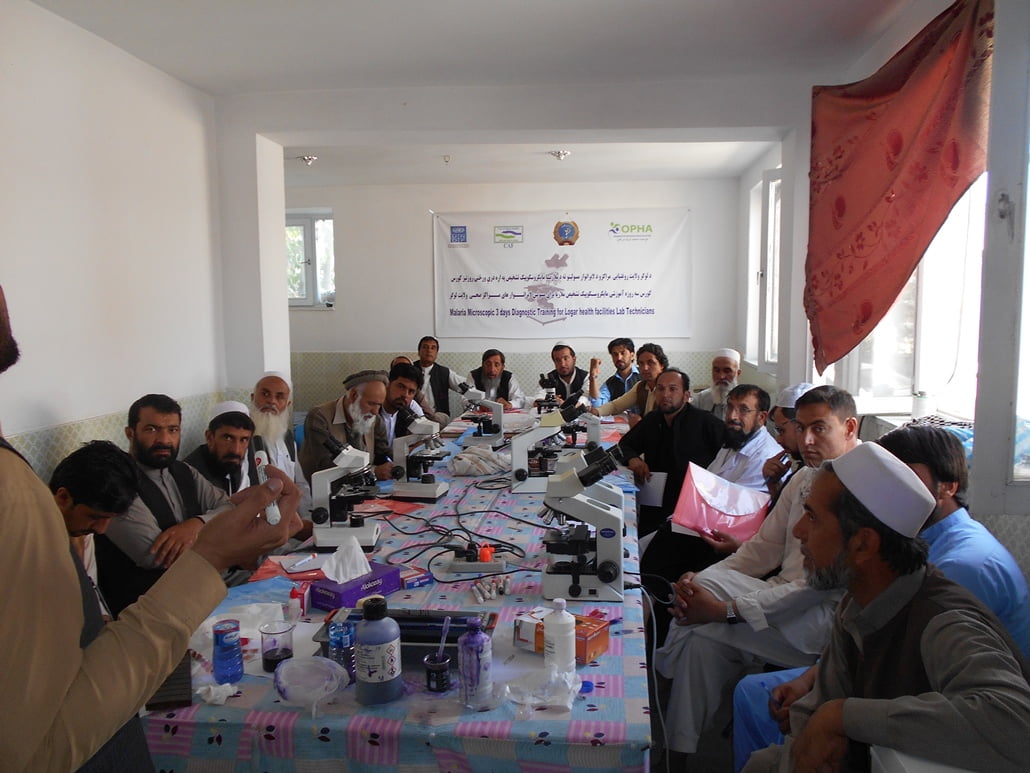
Summery of OPHA Projects
A. OPHA Ongoing projects
- Implementation of BPHS/EPHS project:
OPHA is implementing the BPHS/EPHS project under the Sehatmandi phase in Logar province through a partnership with the CAF organization. The project is started in Jan 2019 and will be ended by July 2020. The project is funded by MoPH/WB. Based on MoU signed with the CAF organization, OPHA is responsible:
1.1. Capacity building and professional development of Logar’s entire BPHS and EPHS staff. (1676 BPHS / EPHS staff) Based on the training plan of the project for the years 2019,2020 and 2021.
2.1. OPHA is also running a total of 232 Health Posts in all seven districts of Logar province. OPHA is responsible for the provision of supply, training, monitoring, reporting, and recording process of all 460 CHWs.
3.1. Running of Lodin DH: OPHA is currently managing Lodin District Hospital,
4.1. OPHA completed 24 Months of the training program of Community Midwifery Education (CME), and Community Health Nursing Education (CHNE) programs in Logar province. A total of 24 community midwives and 24 community nurses successfully graduated from these programs.
5.1. Implementation of the CDC program: OPHA is responsible for the implementation of the control of communicable disease through 47 HFs in all 7 districts of Logar province.
6.1. Implementation of the EPI program: OPHA is responsible for the implementation of the Expanded Program of Immunization Program through 47 HFs in all 7 districts of Logar province. which is including to monitoring EPI program activities, training of vaccinations, recording, and reporting of EPI activities.
2. Implementation of Afghanistan COVID-19 Emergency response and health preparedness project in Logar province: OPHA is implementing the mentioned project in Logar Province through a partnership with CAF. The project is started in Jun 2020 and will be ended at the end of Nov 2020. This project is funded by WB.
The overall objectives of the project are to protect our citizens from the spread of COVID-19, to respond and mitigate the threat posed by COVID-19 in Logar province, and to strengthen national health systems preparedness and capacity to respond to public health emergencies. One of the aims of this project is to avoid disruption of BPHS/EPHS service delivery under the Sehatmandi project.
The specific objectives of this project are:
- To increase public awareness and promote healthy behaviors in regard to COVID-19
- To conduct community surveillance and early detection of COVID-19 suspected cases
- To ensure infection prevention and control measures at the health facilities and community level\
- To Manage and isolate cases of COVID-19 suspected and confirmed cases
3. Implementation of the TP-2 program. The Twinning Program aims to address this by pairing NNGOs with Advisors that provide mentoring and guidance to their Afghan counterparts on institutional management, humanitarian practices, and strategy. The specific objectives of this program are to :
1.3. Increase NNGO participation in the humanitarian clusters
2.3. Build NNGO capacity to access the CHF and other humanitarian funds
3.3. Increase NNGO ability to conduct quality assessments
4.3. Give the entire humanitarian community more access to local knowledge
5.3. Ensure all organizations involved follow international humanitarian principles.
The beneficiary of this project is the OPHA organization. This program is started on Nov 2029 and will be ended by the end of Nov 2020. OPHA has applied for the extension of the program for an additional one year to get further benefit from the technical support of ACBAR and SAF organizations.
B. OPHA Completed projects
4. OPHA implemented the whole of Afghanistan Multi-Sectoral need assessment (MSNSA) 2020 project in Logar province through a partnership with the ACTED organization. The project started in Aug 2020 and ended by the 15th of Sept 2020.
The general objectives of this project are to Inform multi-cluster humanitarian programming for the Afghanistan response by identifying inter-sectoral needs and how they inter-relate across different geographic locations and population groups outlined in the Humanitarian Needs Overview (HNO). Findings from the first assessment will then inform the 2020 HNO, and support the updating of the 2018-2021 Humanitarian Response Plan (HRP) for 2021. WoAAs 2018 – 2023 ultimately aims to capture trends of inter-sectoral/sectoral needs within and across vulnerable populations.
Based on the contract signed with the ACTED organization, OPHA conducted the MSNA survey in three districts of the Logar Province, named Mohammad Agha, Pul-e-ALAM, and Khushi.
The overall aim of the WoAA was to assess and identify sectoral, multi-sectoral, and inter-sectoral needs of crisis-affected populations in Logar province and how they differ across different geographic locations and population groups.
Household-level surveys were conducted inaccessible areas across 3 districts of Logar province The purpose of assessing households in targeted districts was to obtain a nation-wide statistically representative sample of the humanitarian caseload.
The assessment conducted in 3 districts of Logar province named Pul-e-Alam, Mohammad Agha, and Khushi by four enumerators after receiving 3 days of training from July 26th – 28th, 2020 by ACTED. The assessment conducted house by house by four enumerators (Two couples) in three targeted districts. The assessment started from 01, August 2020 and continued to 15, Sep 2020 during the period a total number of 320 interviews have been conducted with 320 HHs (268 HHs in Pul-e-Alam, 40 HHs in Mohammad Agha, and 12 HHS in Khushi).


